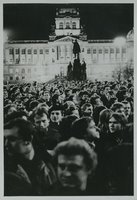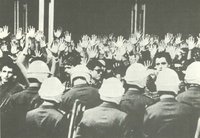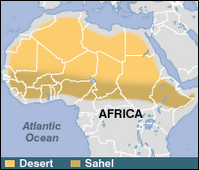Inhale quickly, deeply. Last stick of satisfaction, enjoy it. He searches his dirty pockets for loose change. Even his lighter is empty now, spent it. He pulls up his collar, back pushed against the brick wall. But there is no respite - the icy, biting wind is unheeding and incessant.
The embers of his cigarette glow fiery orange. No one notices in this bleak setting. Alone, he gazes into the world, thoughts vapid. It's this town, God forsaken shit town. It surrounded his vacant eyes. The empty shelves, the empty store, the empty parking lot, the empty homes, the empty...
Exahle, slowly. Let the poison seep out. He watches for his breath to linger in the air, but its every curve is affected with a forceful insouciance. A grey, woolen blanket that offers no warmth, it hung upon this town always, dull, heavy, joyless, "like second hand smoke", suffocating.
He closes his eyes and inhales, some satisfaction. Behind the warm shutters of his eyes, ah, some fiery color, the pulsing colors of glowing life, feeling the chemicals move through his blood, soothing his skin, appeasing some dark corner of his mind. Death by internal ablation, how thorough. My interpretations of reality are formed by merely these, different amounts of different chemicals: neurotransmitters, passing information from neuron to neuron, synaptic certainties. We are chemical machines.
Her embers glow brightly. 1,2,3... Dissipation. But if these chemicals determine how I behave, how I act, who controls these chemicals? Am I slave to these chemical interactions? Are my actions predetermined by a biological fate? Who then, or what, is 'I'?
Eyes open. He looks to the earth. The wind is still vitriolic, biting at his ears, and it is snowing. He sucks in the last remnants of satisfaction. Her orange embers flicker, suffering now it seems, for the end is near. Their's was a tacit relationship: she was never spared. An empty, vague apathy pervades this town, it occurs to him, insomuch as to border a collective nihilistic consciousness. God forsaken shit town. He feels the fire singe his fingertips, but within this shroud of numbness, it makes him feel real. A few more seconds, please...
He drops the stub to the cement. The snow is blowing almost horizontally through the air, pull your collar up fella, but it is in vain, his walk from here is into the wind. As intangible as the wind may be, ever more the ephemeral mind. These chemicals change and act in response to external stimuli. Thus, if my actions are defined by a series of sensory inputs, then perhaps these chemicals simply move through a series of states of being, states of mind, to define each of my actions. Inputs and outputs, cause and effect, this human complex, this self, can it be defined so simply, as an automaton?
Colder and faster, the flakes cut at his frigid skin. The snow, more than a foot deep, touches his knees, and he feels the ice creep into his bones. As the white blanket envelopes him, a furtive darkness has crept across his thoughts. Motionless, breathless, disembodied, spiteful, where the fuck is she? Alas, abandoned, by machinations of an immutable reality. A small house appears, bare and callous, perhaps there is warmth within.
A young girl of forgiving countenance has opened the door, but he cannot see her clearly now; beyond her stands a tall mirror. The reflection in the mirror becomes focused, and he can see himself: he is naked. The girl's voice is mellifluous and yet muffled by the howling winds. He is immobile, but he perceives, engrossed by the reflection. The body can never define the self, it is but a vessel for the burgeoning perceptions and ideas of the mind; it is merely the finite construct with which the mind may effect actions upon reality. But reality can-
The reflection is changing rapidly. He sees himself, an inchoate shadow in the middle of a deserted four-way intersection, and down each path, it seems to him, he can see forever, but he is still immobile. Perception and idea. If I am an automaton, defined by inputs and predictable outputs, the path I take is already decided. If, in this infinite space behind my eyes, this self, my self, can assert its will upon reality, however, then I become the actuator. And yet, my decision, though freely chosen, will be based on external information, inputs, I perceive in my reality. Furthermore, my decision, though freely chosen, will be based on the deterministic properties of cause and effect; specific knowable consequences will follow from my actions. But reality can-
The reflection is changing rapidly again. He sees himself as he is. Perception and idea. Free will of the self and the deterministic nature of the physical world may coexist; the self, an automaton of free will, is guided by the deterministic nature of reality. Yet, the self specifically, actuator of this automaton, remains utterly intangible. The door slams shut. A shadow passes through the gloomy white landscape, mindscape, inscape.
Eyes open. He has fallen. Frostbite, he thinks, a certain appropriation of the senses, even of time. He listens for voices and tries to scream, scream!, scream!! The wind is howling. A sickening dizziness stirs within him the thoughts of her burning, glowing embers. The young girl may find him in time. A fiery orange flame to melt all things frozen...
On the icy cement, the once burning stub is now nearly frozen. Save the cutting winds, there is no sound, but for the falling snow, there is no movement. An eerily calm violence has descended. This much is true, eventually all lights go out. Exhale.
viG ©


